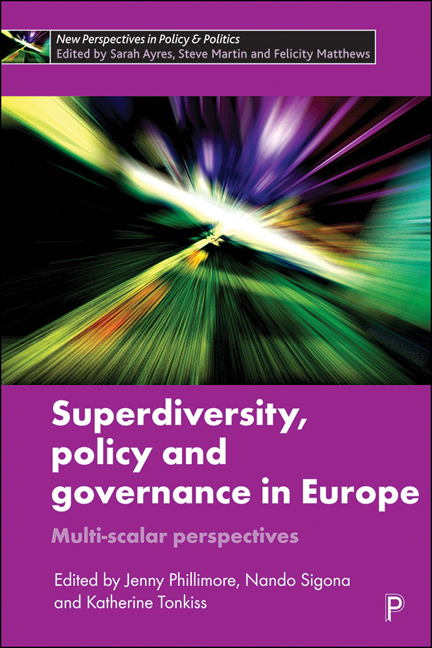Book contents
- Frontmatter
- Contents
- List of Figures and Tables
- Notes on Contributors
- Introduction: Superdiversity, Policy and Governance in Europe
- Chapter One Managing Superdiversity? Examining the Intercultural Policy Turn in Europe
- Chapter Two Mainstreaming in Response to Superdiversity? The Governance of Migration-Related Diversity in France, The UK and the Netherlands
- Chapter Three Making the Most of Superdiversity: Notes on the Potential of a New Approach
- Chapter Four Superdiversity and Sub-National Autonomous Regions: Perspectives from the South Tyrolean Case
- Chapter Five Transmigration: The Rise of Flexible Migration Strategies as Part of Superdiversity
- Chapter Six Superdiversity, Multiculturalism and Local Policies: A Study on European Cities
- Chapter Seven Integrating Superdiversity in Urban Governance: The Case of Inner-city Lisbon
- Chapter Eight Urban Planning and the Challenge of Superdiversity
- Chapter Nine Superdiversity in the Post-Industrial City: A Comparative Analysis of Backlash Narratives in Six European Neighbourhoods
- Index
Introduction: Superdiversity, Policy and Governance in Europe
Published online by Cambridge University Press: 04 March 2021
- Frontmatter
- Contents
- List of Figures and Tables
- Notes on Contributors
- Introduction: Superdiversity, Policy and Governance in Europe
- Chapter One Managing Superdiversity? Examining the Intercultural Policy Turn in Europe
- Chapter Two Mainstreaming in Response to Superdiversity? The Governance of Migration-Related Diversity in France, The UK and the Netherlands
- Chapter Three Making the Most of Superdiversity: Notes on the Potential of a New Approach
- Chapter Four Superdiversity and Sub-National Autonomous Regions: Perspectives from the South Tyrolean Case
- Chapter Five Transmigration: The Rise of Flexible Migration Strategies as Part of Superdiversity
- Chapter Six Superdiversity, Multiculturalism and Local Policies: A Study on European Cities
- Chapter Seven Integrating Superdiversity in Urban Governance: The Case of Inner-city Lisbon
- Chapter Eight Urban Planning and the Challenge of Superdiversity
- Chapter Nine Superdiversity in the Post-Industrial City: A Comparative Analysis of Backlash Narratives in Six European Neighbourhoods
- Index
Summary
Definition and dimensions of superdiversity
Patterns of migration to high income countries until the 1990s mainly consisted of many migrants coming from a few countries to a small number of places. Around the turn of the 1990s, however, a new pattern of migration and associated diversification was observed. In his seminal 2007 chapter, Vertovec highlighted this demographic shift and introduced the term ‘superdiversity’ to describe the effects of new migration patterns and their interaction with existing populations.
Vertovec's invocation of the term ‘superdiversity’ appears initially in relation to London, describing the ethnic and country of origin diversity found in the city as ‘remarkable’. However, since its inception, the concept was meant to move beyond an observation of ethnic and national diversity, to capture the multidimensional aspect of the processes of diversification driven by new migration, including variables such as gender and age, faith, patterns of distribution, language, labour market experiences and different immigration statuses.
Meissner and Vertovec (2015, 550) suggest we focus upon diversity ‘on the move’, moving ‘from analysing diversity to analysing diversifications’. A focus on diversifications implies that superdiversity emerges where specific processes are evident, including:
an ongoing process of multi-layering of newly arriving populations onto pre-existing diverse populations (Grzymala-Kazlowska and Phillimore, 2017);
processes associated with super-mobility (Valentine and Sagrove, 2012) which are driven by globalisation and less expectation that individuals will reside their entire lives in one place;
an increase in the speed of diversification which may vary by locality and also be viewed as problematic, particularly in areas that have little familiarity with diversity (Kaufman and Harris, 2014; Phillimore, 2015);
an increase in the scale of diversity, which frequently attracts the attention of policymakers;
an increase in the spread of diversity to areas unfamiliar with migration. Diversity has moved from becoming a largely big city phenomenon to being observable everywhere;
increasing demographic complexity as more people arrive from a greater range of origins to more diverse receiving localities. This is evident at neighbourhood, city and national level, and is also accompanied by diversification associated with ever-changing migration channels and statuses.
- Type
- Chapter
- Information
- Superdiversity, Policy and Governance in EuropeMulti-scalar Perspectives, pp. 1 - 6Publisher: Bristol University PressPrint publication year: 2020



